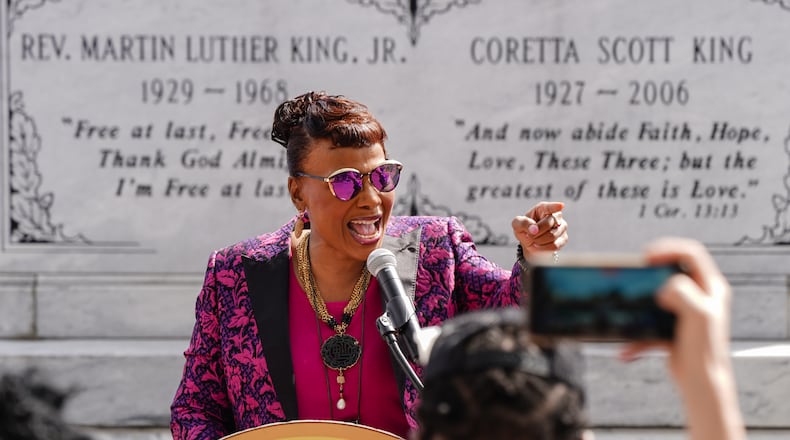An investment company operated by prominent Black Atlantans is capping off Black History Month by making history — becoming the first minority investors, they say, to buy a white-owned bank, converting it into a Black-owned one.
Redemption Holding Company announced Tuesday a deal to acquire Utah-based Holladay Bank & Trust, a woman-led bank that’s operated one branch in Salt Lake City since 1974. The investors include Ashley D. Bell, a former White House policy adviser and Bernice A. King, the daughter of the late Rev. Martin Luther King Jr. and Coretta Scott King. Another partner is former NFL player Dhani Jones.
The Atlanta investors plan to rename the institution Redemption Bank, and they want to target financial services to Black communities, which are historically underserved by financial institutions, focusing on online banking services and small business loans. The deal is pending regulatory approval.
Bell, who worked in President Donald Trump’s administration and is Redemption Holding’s CEO, told The Atlanta Journal-Constitution that growing the number of Black banks in the U.S. is critical to providing equal access to financial services that allow for wealth generation.
“This system has offered no grace and no mercy for Black people in our country,” Bell said. “We think that having a bank called Redemption, where grace and mercy will be bountiful for people who need it, is important.”
Holladay will become the only Black-owned bank in the Mountain West region of the country, according to a Tuesday news release.
Credit: contributed
Credit: contributed
According to Federal Deposit Insurance Corp. records, Holladay is a tiny institution with 10 employees and ended 2022 with $68 million in loans and other assets under management. The bank reported more than $56 million in deposits at the end of last year, and reported $1.3 million in net income, a 27% increase from 2021. Holladay’s current management and staff will remain upon the change in ownership.
James Stevens, the co-leader of the financial services industry group at the Troutman Pepper law firm, said Holladay’s acquisition fits a national trend.
“Increasingly we’re seeing these groups acquire banks to focus on a demographic community, whether that be African Americans, Latin Americans, Asian Americans or specific sectors of the market like young people or old people,” Stevens said.
Bell and Bernice A. King co-founded the National Black Bank Foundation, which has steered $600 million of deal flow into Black banks since 2020. They said acquiring a non-minority bank helps reverse a trend of Black banks dwindling in numbers over recent years. In 2001, there were 48 Black-owned banks insured by the FDIC, but that number has shrunk to roughly 20 now.
Two of those are based in Georgia — Citizen’s Trust Bank in Atlanta and Carver State Bank in Savannah. Other Black banks operate branches in Atlanta, and there are six other minority depository institutions based in Georgia, according to the FDIC. Minority-focused venture capital and financial technology firms are also emerging in Atlanta, such as Greenwood, founded by rapper Killer Mike, former Atlanta Mayor Andrew Young and businessman Ryan Glover.
“In my father’s last public address on April 3, 1968, he preached the imperative to accelerate the financial inclusion of Black Americans by supporting mission-driven Black banks — something he called a ‘bank-in movement,’” King said in the release. “More than half a century of struggle and incremental progress later, we’re making good on daddy’s call to bank-in by creating new centers of opportunity for people of color, starting with this Black-led bank acquisition.”
Redemption Holding’s board and investors consist of “a growing number of Black doctors, lawyers and business leaders from across the country,” the release said. The company plans to continue Holladay’s existing functions while adding a digital banking platform and offering both small business loans and mortgages through partnering with major national lending institutions.
David Oliver, chief operating officer of the Georgia Bankers Association, said it’s more common for investors to purchase existing small bank charters rather than starting their own, although it still remains fairly rare.
He added that investors who purchase a bank charter usually aim to change its business model as Redemption is planning by rebranding and focusing on digital services and national expansion. Oliver said banks with focused missions on serving specific underbanked communities have historically found success.
“The number of unbanked and underbanked household numbers (in Georgia) have dropped in each of the past four FDIC studies, so it’s good to see the attention on that,” Oliver said. “And we’re happy to have another bank with that as their mission.”
Despite increasing efforts, the racial wealth gap has been difficult to reduce. According to recent data from the Federal Reserve Bank of St. Louis, Black families had 25 cents for every dollar of white family wealth on average.
Bell said the bank’s initial focus will be on serving its Utah customer base, but he said expansion is the eventual goal.
“This truly hits on the moniker that Atlanta influences everything,” Bell said. “We’re in this city... talking about an acquisition in the Rocky Mountains that is going to be able to affect the entire country and Black people across America.”
About the Author
Keep Reading
The Latest
Featured




